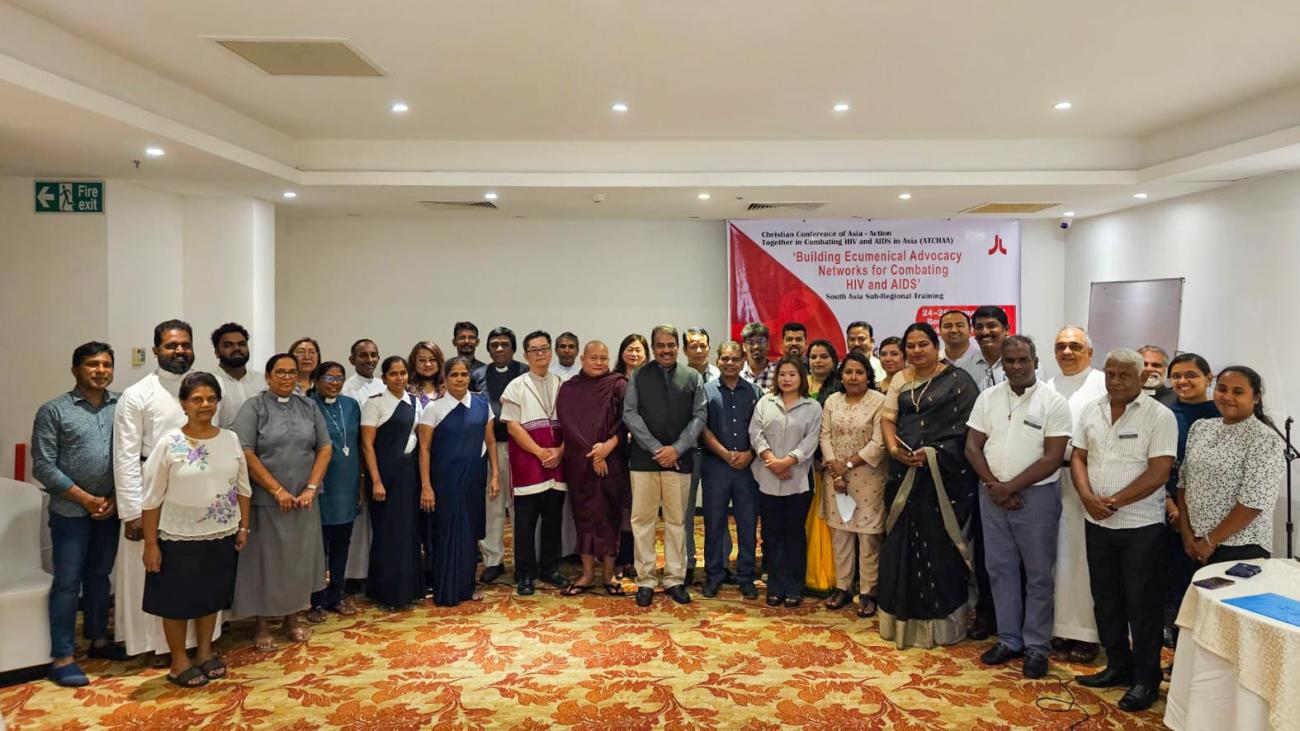South Asia Sub-Regional Training on ‘Building Ecumenical Advocacy Networks for Combating HIV and AIDS’ begins in Colombo, Sri Lanka

Colombo, Sri Lanka: South Asia Sub-Regional Training on ‘Building Ecumenical Advocacy Networks for Combating HIV and AIDS’ participants
Colombo, Sri Lanka: The Christian Conference of Asia’s (CCA) South Asia Sub-Regional Training on ‘Building Ecumenical Advocacy Networks for Combating HIV and AIDS’ was opened this afternoon in Colombo, Sri Lanka.
The sub-regional training, being held from 24–26 January 2024, brought together over thirty participants including clergy, church workers, health professionals, health workers, shelter home carers, medical and social counsellors from church-related institutions as well as social activists, and members of NGOs working in the field of HIV and AIDS. The participants hail from India, Sri Lanka, Bangladesh, and Myanmar.
The opening address was delivered by the CCA General Secretary Dr Mathews George Chunakara who highlighted the trend of South Asia’s HIV epidemic situation, which is spreading within an environment of stigma, discrimination, and denial.
The CCA General Secretary further added, “Our biblical and theological conviction reminds us about God who animates, sustains, and protects life and this belief is grounded in a theology of life. God’s gifts of life, dignity and love obligate humans to affirm that these gifts are extended to all humanity as God’s redemptive love embraces everyone in the world. The suffering and death resulting from HIV and AIDS have impeded the hope of God’s promise for life in its fullness and abundant life.”
He quoted studies on situations in South Asia where people living with HIV (PLHIV) face serious rights violations. Many are tested without consent and their confidentiality is often breached, leading to harassment and rejection by families and communities. HIV-positive people have lost their livelihoods and homes; some have been subjected to violent attacks and denied access to basic and lifesaving medical care.
Recognising the complex factors that fuel the epidemic, poverty, low literacy, outbound migration, tourism, internal displacement, lack of adequate healthcare systems, and social and cultural values that are hampering the response to HIV, Dr Mathews George Chunakara stated, “What is required in South Asia is a comprehensive and rights based-response and policy that will aim to build an environment where the rights of all members of society are protected; where social space is created to address HIV and related issues; and where the dignity of PLHIV are recognised and upheld.”
Rev. Sujithar Sivanayagam, General Secretary of the National Christian Council in Sri Lanka (NCCSL), and Rev. Ebenezer Joseph, President of the Methodist Church in Sri Lanka, greeted and welcomed the participants at the opening session. The Methodist Church in Sri Lanka is the local host and coordinator of the training programme together with the NCCSL.
Rev. Fr. Philip Kuruvilla facilitated the first session which focused on ‘Health and healing from the perspective of Christian mission and witness’.
Various other sessions of the South Asia regional programme will include ‘Biblical-theological reflection on towards inclusion of PLHIV’, ‘Participation of communities in combating HIV and AIDS’, ‘Churches’ participation in responding to HIV’, ‘Addressing stigma and discrimination: role of local congregations’, ‘Awareness-building and advocacy’, ‘Pastoral care and accompaniment’ as well as well as workshop sessions for preparing an agenda for establishing local advocacy networks in South Asian countries.
The purpose of the training is to build the capacity of volunteers in advocacy, especially by way of creating networks of churches in Asia and interfaith initiatives for advocacy at the grassroots. It is also expected to deepen a relevant and contextual theological understanding of health and healing ministry.
“Asia is home to an estimated 6.5 million people living with HIV and 300,000 new infections in 2022. Without supportive national policy environments, many people living with and affected by HIV continue to experience stigma and discrimination that prevents them from accessing prevention methods, treatment, and care,” stated Dr Ronald Lalthanmawia, Coordinator of the CCA’s Action Together in Combating HIV and AIDS in Asia (ATCHAA) programme.
“Faith-based organisations have historically played an important role in delivering health and healing-related social services. The training programme intends to maximise the capacity of churches and faith-based organisations to deliver care, treatment, and support to the most vulnerable of populations affected by HIV,” added Dr Lalthanmawia.
The CCA, through its Action Together in Combating HIV and AIDS in Asia (ATCHAA) programme, has been engaged in equipping its member churches and councils to effectively respond to HIV and AIDS issues in Asia.










